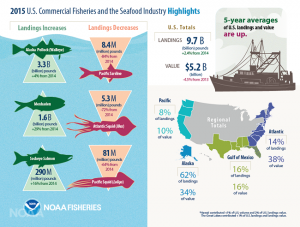Are you adding more seafood to your diet these days? It turns out most Americans are. A new report from the National Oceanic and Atmospheric Research Administration’s “Fisheries of the United States” says Americans added an extra pound of fish and shellfish to their plates last year. That means profits for U.S. fisherman should be going up, too. But not for U.S. fisherman along the Great Lakes who specialize in one of the area’s favorite catches: whitefish. And it’s all because of new competition from their Canadian counterparts.
Interlochen Public Radio’s Peter Payette says Russia started the problem. He says, “Two years ago, when Russia annexed Crimea, western countries responded by imposing sanctions on Russia. And Russia responded to that with its own sanctions, including bans on food imports from western countries. Canada used to send a lot of fish over to Russia, a lot of whitefish. And all of a sudden that was not possible anymore.”
Canadian fishermen saw the opportunity, and started flooding U.S. markets with its whitefish, at a lower price than U.S. fisherman were asking, putting a big dent in the profits of Great Lakes fisherman.
The price of whitefish in the U.S. is now about half what it was three years ago, because of these new emerging problems with international trade.
Michigan State University and University of Michigan’s “Michigan Sea Grant”, which supports research, outreach and education to enhance sustainable use of Great Lakes Resources, says eleven million pounds of whitefish was harvested each year from the Great Lakes from 1981 to 1999. And though the harvest has declined to about eight million pounds a year in recent years, prices haven’t increased. U.S. fisherman once got as high as $1.04 a pound for whitefish. but the current average has now dropped as low as about forty cents a pound.
It’s a boon for consumers, but not for U.S. fishermen.
Great Lakes Now checked with seafood sellers throughout the Great Lakes. U.S. Retailers say they’re selling fish about a dollar cheaper per pound than last year – about $4.99 a pound.
Here’s an example of how the Russian sanctions have trickled down to the Great Lakes fishing industry: New York is a big market for whitefish. So when Canada could no longer sell as much overseas, whitefish caught in Canada started flooding the New York markets at a cheaper price than U.S. fish. What makes matters worse: Canada’s dollar is now about 75 cents to the U.S. dollar.
Interlochen Public Radio’s Peter Payette says one of the biggest problems with fishing for Great Lakes whitefish is that demand is highest in the summer, when restaurants are busy and families want to grill fish on the barbecue, and that’s also the most difficult time for fisherman to do their jobs.
Payette says “That’s when it’s the hardest to catch the whitefish. They’re out deeper, they’re hard to get at. In the fall, they’re easier to get because they come into shallower water, but there’s not as much demand.”
But Payette says in New York, smokehouses and Jewish delis continue to buy whitefish from Great Lakes fishermen into the fall, especially in time for Yom Kippur and Rosh Hashanah in early October. And that’s when Canadian fisherman really get the edge on U.S. fishermen.
So: how can U.S. Great Lakes fishermen prevent losing more of their market to Canada and increase their profits? Large whitefish processors and handlers say they’re trying to emphasize reaching local markets through independent regional stores and farmer’s markets. They’re hoping that U.S. shoppers in the Great Lakes will support their local fisherman in the same way they support their local farmers.





